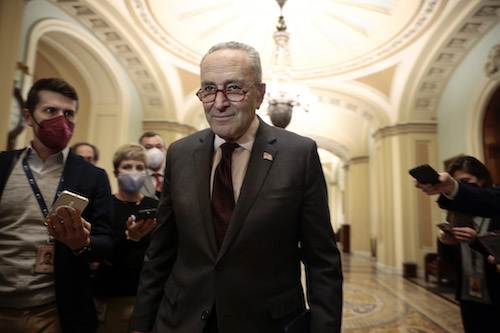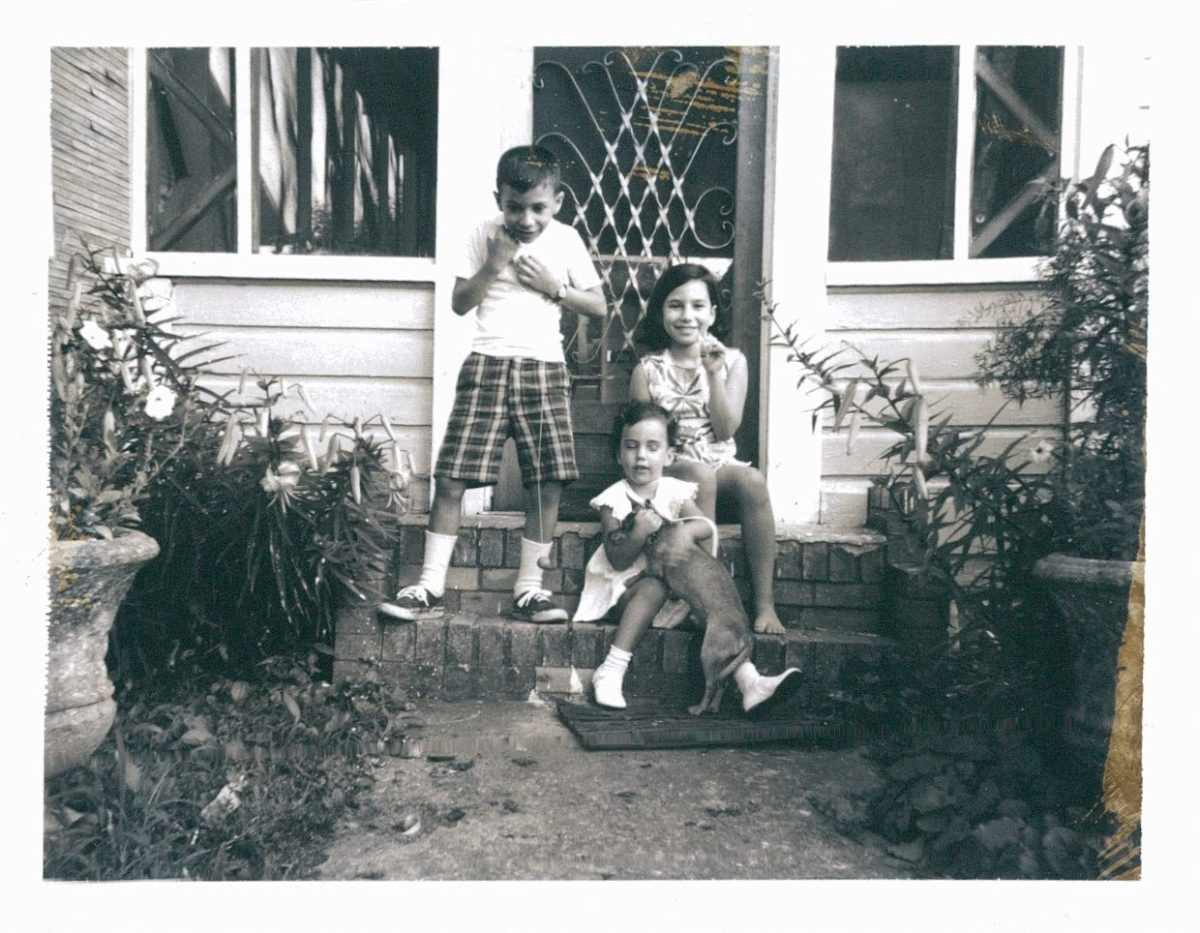Your Daily Phil: Birthright resuming trips next week + Proposed religious pre-K funding changes to BBB
Good Tuesday morning!
Despite renewed travel restrictions on foreigners due to the spread of the Omicron COVID-19 variant, Birthright trips will be permitted to enter Israel as of Dec. 19.
Birthright participants will be subject to the same requirements as Israeli citizens when they arrive in the country: Participants must have been vaccinated or have received a booster in the last six months, and they must complete a three-day quarantine upon arrival, according to a copy of a memo sent to trip providers.
“If for example, they land on a Sunday afternoon that will be the first day, Monday will be the second and ideally they can even do a PCR test on Monday at Midnight or early morning on Tuesday,” the memo explained. “3-4 hours later, when all results come in, the trip can begin.” All trips must obtain special approval from Israel’s Population, Immigration, and Border Authority.
CHILD CARE CONSIDERATIONS
Senate modifies child care provisions in Build Back Better Act


Anna Moneymaker/Getty Images
The Senate’s Health, Education, Labor and Pensions (HELP) Committee released an updated draft of the Build Back Better Act over the weekend that includes several changes to child care and pre-K provisions pushed by religious groups, Jewish Insider’s Marc Rod reports. The Orthodox Union and Agudath Israel of America had, in coalition with other religious organizations, lobbied for changes to provisions they said would bar religious providers from receiving funding under these programs unless they drastically changed and secularized their programs.
Ch-ch-changes: In the latest draft of the bill, the Senate removed provisions subjecting child care and pre-K funding to a series of additional anti-discrimination requirements under the 2007 Head Start Act. Those provisions, activists said, could exclude single-sex programs and bar providers from giving preference to families of their own faith. The Senate also removed a provision designating child care aid as federal financial assistance to child care providers, which activists said could make religious groups ineligible.
Two out of three: The groups’ third major request — reworking the universal pre-K program from direct aid to providers into a certificate program providing funding to parents — was not included in the new Senate draft. “Unfortunately, as the bill is currently written, [universal pre-K] funding will only be provided in the form of direct aid, allowing faith-based participation but only to programs that have been secularized — not a realistic option for religious providers or the parents they serve,” Abba Cohen, Agudath Israel’s vice president for government affairs, told Jewish Insider.
Leeway: Nathan Diament, executive director of the OU’s Action Center, said that there may be ways for religious pre-K providers to still receive some funding depending on how states implement the program. He offered the example of New York City’s pre-K program, which pays for half-days of non-religious instruction at religious pre-K schools, leaving a half day of privately financed religious education.
On the horizon: The Supreme Court’s decision in Carson v. Makin, a pending case involving government funding for religious schooling, could also shake up the pre-K funding provisions. Observers on both sides of the issue expect the Court, which heard oral arguments in the Maine case last week, to rule in favor of parents seeking to use public funding to pay for religious schooling, but it’s unclear how far the Court will go in changing precedents on public funding of religious schools.
FUTURE ORIENTED
Jews and ‘The Real America:’ How Jewish life transcends migration patterns


Courtesy
“It wasn’t until my mid-20s that I realized how profoundly interesting our family’s narrative is. Our family didn’t have any direct connections to the Holocaust, no recent immigration narratives, and despite being Southern California Jews, no stories from Mexico, South Africa or Iran,” writes Margalit C. Rosenthal, West Coast regional director of the Foundation for Jewish Camp, in an opinion piece for eJewishPhilanthropy.
Family history: “My 93-year-old Zayde was born in the 1920s in a place then-known as Creel Town, Ala., and went to school in Dora, about 25 miles outside of Birmingham, ‘the country.’ His own parents arrived in America as infants at the start of the 1900s; my great-grandmother Mary (Miriam) was raised in Birmingham. The family owned a general store — ‘The Jew Store,’ as the neighbors called it at the time. The family’s house was attached, and even though the store sold treif (non-kosher food) at the deli counter, the family kept a kosher kitchen, getting meat on the railway express from Philadelphia. Upward mobility meant moving to Birmingham proper – though they still couldn’t afford to live in the wealthy Jewish neighborhood of Mountain Brook, an enclave created by Jews who were turned away from other neighborhoods… Despite (or perhaps because of) the charged environment in the South in the mid-1900s, my relatives remained proud and active Jews, generations of members of the only Conservative synagogue in town.”
New initiative: “These smaller Jewish communities are often overlooked, assumed to be dwindling or dying out as synagogues merge or close their doors and younger generations are attracted to larger cities. But the closure of synagogues doesn’t give us the full picture of the Jewish communities… While I can’t imagine there are any Jews left in Creel Town or Dora, after my experience this year, I’ll admit that I could be absolutely wrong. In a dark year of a pandemic and civil unrest, I had the privilege to help shine a bright light for families – through the Small Communities Incentive Program at the Foundation for Jewish Camp. Funded by a national foundation dedicated to raising the quality of Jewish education and strengthening Jewish identity and in partnership with, and with great appreciation for, a geographically and Jewishly diverse group of camps, we collectively reached out to these smaller Jewish communities to recruit and offer incentives to new campers.”
APPLIED JEWISH LEARNING
Jewish learning for today’s Jewish adults: New approaches for new times


Shutterstock
“When I was in my early 30s – in a previous century – I met and fell in love with an observant Jewish woman with two young daughters, ages 2 and 5. As our relationship deepened and we began to discuss marriage, this woman (now my wife of almost 29 years) made clear to me that, if I was serious about her, I’d have to get serious about Judaism. I had been raised with almost nothing in the way of observance or education, while Jewish identity and worship had always been fundamental to who she is. If I was going to commit to her, she said, I had to commit to becoming a Jewishly educated partner and parent,” writes David N. Gottlieb, director of Jewish studies at Spertus Institute for Jewish Learning and Leadership, in an opinion piece for eJewishPhilanthropy.
The need to shift gears: “I tell you all this not because I’m interviewing for a job with your organization, but because I have learned in a wide variety of Jewish educational settings. Most of them shared two basic assumptions: That Judaism was central to my identity, and that my life centered around a Jewish community. It’s become clear to me that adult Jewish learning must be reconceived for a new generation of Jews and ‘Jewish-adjacent’ individuals and families – people for whom these two assumptions are not necessarily true.”
Different prior experiences: “In the coming years, a large generation, featuring a significant proportion of unaffiliated and religiously non-observant Jews and ‘Jewish-adjacent’ partners, will be entering the heart of adulthood. Most of these people will not have experienced Jewish day school, Hebrew school, b’nai mitzvah or Jewish camp. They will not be major donors to Jewish causes or regulars at synagogue. And they will not be reached by Jewish adult education programs that are geared primarily toward people already committed to Jewish belonging.”
New customers: “Adult learning programs have most often been tailored to ‘parents and grandparents in our communities, the donors, the agency leaders, the creators and entrepreneurs.’ Going forward, such programs will fail to reach most adults for whom Judaism is an important but neglected aspect of their identity. This is not to say that adult education programs should not have communal leaders as a primary audience. Rather, it’s to ask: How can we bring Judaism’s richness to those who are alienated from it? Such individuals may feel misunderstood, or even unwelcome, in environments that assume more traditional approaches to Jewish education, belonging and practice.”
Worthy Reads
Gendered Giving: MacKenzie Scott has faced undue criticism surrounding her charitable giving, writes Women’s Funding Network President and CEO Elizabeth Barajas-Román in Inside Philanthropy, in large part due to her gender. “And despite working with the Bridgespan Group, a nonprofit that advises philanthropies set up by Gates, Bloomberg, and the Ford and Rockefeller foundations, Bloomberg ran a headline calling her donation a ‘giving spree,’ as if, like a character in ‘Clueless,’ she impulsively and thoughtlessly blew all of her daddy’s lunch money on stilettos at the mall. It’s not difficult to see that sexism persists as part of our culture’s discomfort with women having extreme power, stepping into roles that have historically only been available to men.” [InsidePhilanthropy]
Family History: The Washington Post‘s Sydney Page spotlights the story of a family torn apart during the Holocaust. Dena Morris and Jean Gearhart, knowing of the existence of an older sister born in a concentration camp, used DNA testing to track down her daughter, living an ocean away in the U.K. “’The Holocaust is considered a black hole for many when it comes to researching their family history,’ said Nitay Elboym, a researcher at MyHeritage, who was involved in cracking the case. ‘Stories like these are why we do what we do.'” [WashPost]
Community Comms
Be featured: Email us to inform the eJP readership of your upcoming event, job opening, or other communication.
Word on the Street
A new edition of the Jerusalem Talmud, with a complete English translation, is now available in Sefaria’s free, open-source library… The Jewish Museum and Film at Lincoln Center will present the 31st annual New York Jewish Film Festival in person and virtually Jan. 12-25… Visions of Abraham, a nonprofit working to create and promote educational initiatives relating to interfaith programming between Muslims and Jews, has launched. The organization specializes in creating immersive tours of the UAE and its Jewish community.… A delegation of 16 Jerusalem high school studentsare in Dubai this week for an academic exchange mission with youth from the United Arab Emirates… The Hadassah Foundation, in partnership with Shalom Task Force and JWI, is hosting an educational briefing to learn about new initiatives in the North American Jewish community that aim to prevent gender-based violence… America’s Black Holocaust Museum in Milwaukee announced a $10 million gift from an anonymous donor to help reopen the museum in February 2022… Emily Collins-Ellis has been appointed CEO of I.G. Advisors, a London-based consultancy working with philanthropists, businesses and nonprofits to create social and environmental impact…
Pic of the Day


Rabbi Levi Duchman announced the opening of Camp Gan Izzy, Dubai’s first Jewish camp, with 50 young campers joining for the first day.
Birthdays


Hiroyuki Ito/Getty Images
President of Bard College since 1975, he is also music director of the American Symphony Orchestra and conductor laureate of the Jerusalem Symphony Orchestra, Leon Botstein..
Dean emeritus at Yeshiva University’s Rabbi Isaac Elchanan Theological Seminary, Rabbi Zevulun Charlop… President emeritus of George Washington University, he is an attorney in the DC office of Rimon Law P.C., Stephen Joel Trachtenberg… Co-founder of Creative Artists Agency and later president of the Walt Disney Company, Michael S. Ovitz… Retired NY State assistant housing commissioner, he also served as a military chaplain for 38 years, Jacob Goldstein… Retired SVP at Warner Brothers and active on the Democratic platform committee, Howard Welinsky… Director of government affairs at the Jewish Federation of Greater Philadelphia, Robin Schatz… Member of Knesset, Avi Dichter… Serial entrepreneur and author of Let There Be Water, Seth “Yossi” Siegel… Hedge fund manager, John Paulson… Owner of Bundles of Boston, Sheree Boloker… Retired CEO of San Francisco-based Jewish LearningWorks, David Jonathan Waksberg… Nurse and mental health counselor, Martina Yisraela Rieffer… Founder of the Center for Class Action Fairness, Ted Frank… Partner and COO of Chicago-based Resolute Consulting, David Smolensky… British chef, restaurateur and food writer, Yotam Assaf Ottolenghi... Senior rabbi of the Beth Jacob Congregation of Beverly Hills, Calif., Kalman Topp… Policy counsel in the criminal defense practice at The Bronx Defenders, Eli Clemans Northrup… Safety and special teams player for the New York Giants, he won three Super Bowls with the New England Patriots, Nathan “Nate” Ebner… SVP at TL Management, Matt Kosman… Former offensive lineman for the New York Giants, now a medical sales representative at Stryker, Adam Bisnowaty… Teen theater and voice actress, Mia Sinclair Jenness… Senior media relations associate at Chabad, Tzemach Feller…
Email Editor@eJewishPhilanthropy.com to have your birthday included.








